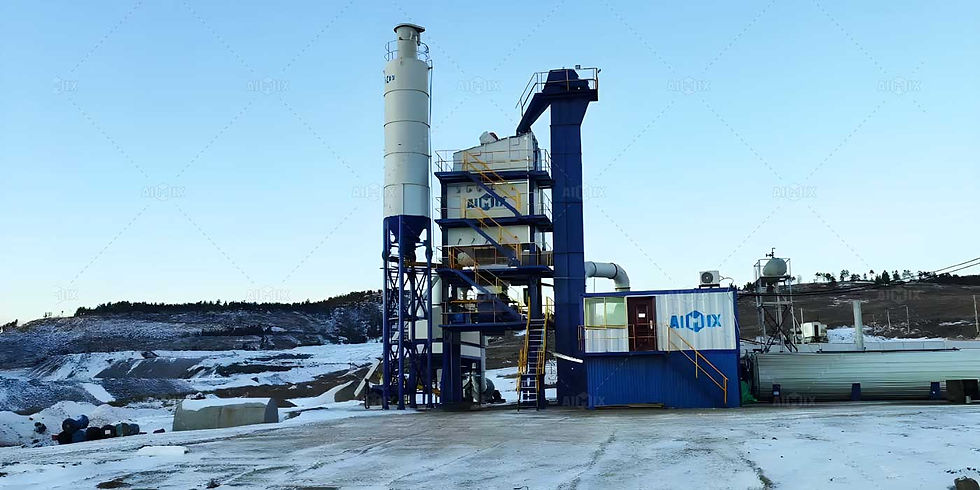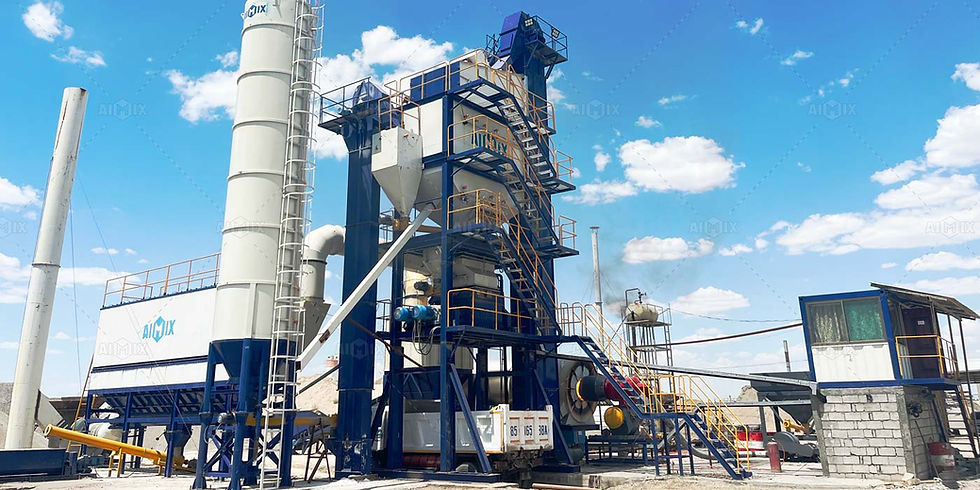How Does the Cost of a Portable Asphalt Plant Compare to a Stationary Asphalt Plant?
- aimixglobal5
- Nov 1, 2024
- 3 min read
When considering an investment in an asphalt plant, understanding cost differences is essential for project success. Both portable and stationary asphalt plants offer unique advantages, and knowing which option best aligns with your operational and budgetary needs can make a substantial difference. Let’s explore the key factors that differentiate these two plant types and help you decide which option is most suitable for your construction projects.

Initial Cost of Portable vs. Stationary Asphalt Plants
To start, the upfront investment for a portable asphalt plant is typically lower than that for a stationary plant. Portable plants are designed to be easily transported and installed, which reduces setup costs. Stationary asphalt mixing plant for sale, on the other hand, often requires more substantial foundation work and infrastructure, contributing to higher initial expenses.
However, while portable plants may seem more cost-effective initially, it’s important to consider long-term project requirements. For contractors with frequent location changes, portable plants offer flexibility that can save costs over time. But if your project demands long-term, continuous asphalt production, a stationary plant may justify its higher upfront cost with consistent, high-capacity production capabilities.
Operational and Transportation Costs
After installation, operational and transportation costs begin to reveal additional differences between portable and stationary asphalt plants. Portable plants are built for mobility, which allows contractors to move them closer to specific project sites, reducing transportation costs associated with asphalt delivery.
Stationary plants, meanwhile, may require significant trucking logistics if the project site is far from the plant. Over time, transportation expenses add up, impacting your overall project budget. Here, contractors must weigh the convenience and potential savings of a portable plant against the steady operational costs of a stationary one, especially if the project spans across multiple regions.
Maintenance and Longevity
Maintenance costs also factor into the total cost equation. Stationary plants are generally designed for longer lifespans, with sturdier components and larger production capacities. As a result, they may require fewer repairs over the years, particularly when well-maintained.
Portable plants, though durable, are subject to more wear and tear due to frequent relocation. While modern portable plants are engineered for durability, frequent setup and breakdown cycles can lead to higher maintenance costs in the long run. Therefore, if your construction company prioritizes minimal maintenance and maximum longevity, a stationary plant might provide the most reliable performance over time. Get the overall asphalt equipment cost from AIMIX now!

Production Capacity and Cost Efficiency
Another key factor is production capacity. Stationary asphalt plants generally have higher production capacities, which makes them ideal for large-scale projects requiring continuous asphalt supply. Their robust design allows for consistent high-output production, potentially reducing the cost per ton of asphalt in large projects.
Portable asphalt plants, in contrast, are often more suited to smaller or medium-sized projects. They offer versatility and speed, but their smaller production capacity may affect the per-ton cost of asphalt if high volumes are needed. Contractors working on a variety of project sizes need to evaluate whether the flexibility of a portable asphalt batch plant offsets the potential savings from high-capacity stationary plant production.
Which Option is Best for Your Project?
The decision between a portable and stationary asphalt plant largely depends on your specific project requirements. If your projects frequently change locations, or if you manage smaller, shorter-term contracts, a portable plant may be more cost-effective. Portable plants provide mobility and ease of installation that can be crucial for meeting tight project deadlines and budgets in various regions.
On the other hand, if you are managing large, long-term infrastructure projects requiring continuous asphalt production, a stationary plant may offer better cost efficiency. Despite the higher upfront cost, its durability, higher production rate, and lower maintenance needs can ultimately lead to significant savings.

Why AIMIX is the Ideal Choice for Asphalt Plant Solutions
AIMIX offers a wide range of high-quality asphalt plants, both portable and stationary, to meet diverse project needs. Our products are designed to deliver reliable performance, efficiency, and cost-effectiveness. Whether you need a versatile portable plant for various locations or a robust stationary plant for long-term production, AIMIX has the ideal solution for your project. Contact us today to find the best asphalt plant that fits your budget and operational requirements.
Choosing the right asphalt plant is crucial for cost efficiency and project success. With AIMIX, you can be confident that you’re making a smart investment for the long term. Let us help you achieve optimal performance and cost savings on your next project!



Comments